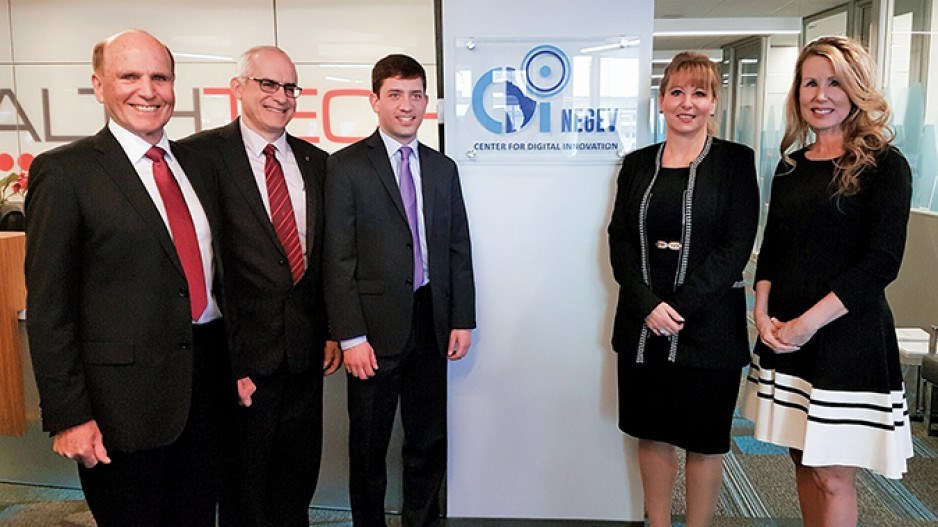After the election of Stephen Harper in 2006, ending almost a decade and a half of Liberal governance, the newly elected Conservative leader signalled a shift in policy toward Israel. Harper forged a close relationship with Israeli Prime Minister Benjamin Netanyahu, strengthening ties between the countries in a number of areas, including policy, trade and science.
One of the areas the two leaders deemed necessary to collaborate on was neuroscience and the study of the brain.
From 2010 to 2012, neuroscientist Ryan D’Arcy, who then was working for the National Research Council, co-led the brain delegation to the Canada-Israel Technology Innovation Summit. In 2013, D’Arcy returned alongside the city’s then-mayor, Dianne Watts, as part of Surrey’s Innovation Boulevard trade partnership – the first of numerous trips aimed at bolstering trade and technological co-operation between Surrey and Israel.
Now Surrey’s Health and Technology District has signed a memorandum of understanding (MOU) with the Center for Digital Innovation (CDI) in Israel, further cementing a relationship between the countries’ health tech sectors. D’Arcy said the goal is to break away from a competitive mentality, whether it’s locally, regionally, nationally or internationally, and instead collaborate as a planet when it comes to issues like health care and technology.
“Rather than focus on what we are or are not doing here locally, our investment should be focused on who we partner with to bring us the requisite strength and expertise to take B.C. tech to a different stratosphere,” D’Arcy said.
With a population of just over eight million, Israel has a widely respected technology sector that punches far above its weight. In a 2014 Forbes story naming the top 10 global health technology companies, six were from Israel.
Daniel Blumenthal, the CDI’s director of business development, was in Surrey recently to celebrate the MOU.
The CDI is in Beersheba’s Advanced Technologies Park, widely known as the Silicon Valley of the Middle East. The CDI is a non-profit organization that also partners with Ben-Gurion University of the Negev, focusing on such areas as digital health care, aging, smart cities and start-up companies. Blumenthal said the goal is to continue to merge health care with both technology and business, and to let entrepreneurs drive innovation as much as the scientists do.
“Maybe it’s not familiar in Canada, but it’s definitely the way innovation works in Israel and definitely the way ecosystems work in Israel,” Blumenthal said. “The idea of looking at it from a business mind is something that is quite familiar. And thinking about the end result as a deliverable and getting something done, and I think that the’s ultimate point of this MOU is to get something done.”
Surrey’s Innovation Boulevard, a collaborative health-care technology venture between a number of entities including Simon Fraser University, Fraser Health, Surrey Memorial Hospital and the City of Surrey, has itself blossomed over the past few years under the direction of D’Arcy.
Most recently Vancouver developer the Lark Group, in partnership with the Dayhu Group, has sold out the first of eight office towers it has planned for its Health and Technology District within Innovation Boulevard. The second tower, now under construction, has sold 60% of its 172,000 square feet of office space at $500 per square foot. In all, the development will cover about one million square feet of office and retail space next to Surrey Memorial Hospital in a 600-hectare city centre redevelopment that has spurred $12 billion in new construction over the past 10 years. Israel’s CDI will also physically occupy space in the second tower.
Every year the Centre for Israel and Jewish Affairs takes around 100 Canadians on trips to Israel, helping facilitate visits for such entities as the City of Surrey, the provincial government and the Conference Board of Canada.
David Berson, executive director for the B.C. and Alberta region for Canadian Associates of Ben-Gurion University of the Negev, was on hand at the official announcement for the MOU, representing the Centre for Israel and Jewish Affairs. He noted the cultural implications of Surrey and Israel “trying to think outside of the box.”
The partnership between the two countries’ hubs was finalized during a recent trade mission that was organized by the Conference Board of Canada and participated in by Rowena Rizzotti, vice-president of health care and innovation for the Health and Technology District.
The MOU also seeks to offer a blueprint by which health technology can be shared between Surrey and Israel without hitting the kind of roadblocks that might normally arise in international collaboration.
Berson also noted that Beersheba, the largest city in southern Israel’s Negev desert, has much in common with Surrey.
“When I think of the mayor of Beersheba and the mayor of Surrey, I think they’re both fighting to get themselves on the national map.”
– With files from Frank O’Brien




